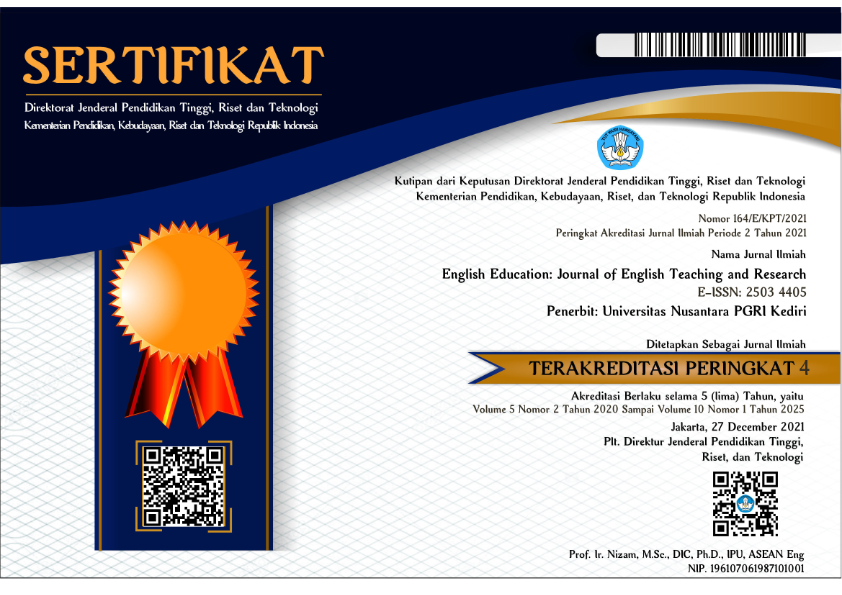Teachers' Strategies to Encourage Students' Participation in English Classroom
DOI:
https://doi.org/10.29407/jetar.v9i2.22796Keywords:
Case Study, Students' Participation, Teachers' StrategiesAbstract
Teachers have an important role in creating a supportive environment in English lessons and should encourage students to participate actively. Appropriate teaching strategies can be employed to encourage student participation in the English classroom. This study was conducted to investigate strategies used by the teachers to encourage students’ participation in the English classroom at SMPN 01 Sungai Raya. The researcher employed a case study methodology, utilizing observation, interview, and document analysis as data collection methods to identify the strategy used by English teachers to encourage student participation. Based on the findings from observation, interview, and document analysis, it can be concluded that English teachers employed various strategies to encourage student participation in the classroom, such as questioning strategy, collaborative learning, motivational learning, and differentiation learning.
Downloads
References
Creswell, J. W., & David Creswell, J. (2018). Research design: qualitative, quantitative, and mixed methods approaches (Fifth Edit). SAGE Publications.
Dos, B., Erdal, B., Ceyda, A., Betul, T., Nurgul, C., & Cevahir, D. (2016). An analysis of teachers questioning strategies. Educational Research and Reviews, 11(22), 2065-2078. https://doi.org/10.5897/err2016.3014
Forslund Frykedal, K., & Hammar Chiriac, E. (2018). Student collaboration in group work: inclusion as participation. International Journal of Disability, Development and Education, 65(2), 183–198. https://doi.org/10.1080/1034912X.2017.1363381
Ghavifekr, S. (2020). Collaborative learning: A Key to Enhance Students’ Social Interaction Skills. Malaysian Online Journal of Educational Sciences, 8(4), 9-21.
Mulyawati, Y., MS, Z., & Edwita. (2022). Differentiation learning to improve students’ potential in elementary school. Jurnal Ilmiah Pendidikan, 06(01), 68–78. https://doi.org/10.55215/pedagonal.v5i2.4485
Phungphai, K., & Boonmoh, A. (2021). Students’ Perception towards the Use of Rewards to Enhance Their Learning Behaviours and Self-Development. JEE (Journal of English Education), 7(1), 39–55. https://doi.org/10.30606/jee.v7i1.637
Shanmugavelu, G., Ariffin, K., Vadivelu, M., Mahayudin, Z., & R K Sundaram, M. A. (2020). Questioning Techniques and Teachers’ Role in the Classroom. Shanlax International Journal of Education, 8(4), 45–49. https://doi.org/10.34293/education.v8i4.3260
Wahyuninsih, S., & Lestari, Y. B. (2023). Implementation of differentiated instruction in project based English language learning: a case study at Sman 1 Lambu. International Journal of Multicultural and Multiregious Understanding, 10(9), 133–138. http://dx.doi.org/10.18415/ijmmu.v10i9.5044
Yin, R. K. (2014). Case study research design and methods. Thousand Oaks, CA: Sage Publications, Inc.
Downloads
Published
Issue
Section
License
Authors who publish with this journal agree to the following terms:
- Copyright on any article is retained by the author(s).
- The author grants the journal, the right of first publication with the work simultaneously licensed under a Creative Commons Attribution License that allows others to share the work with an acknowledgment of the work’s authorship and initial publication in this journal.
- Authors are able to enter into separate, additional contractual arrangements for the non-exclusive distribution of the journal’s published version of the work (e.g., post it to an institutional repository or publish it in a book), with an acknowledgment of its initial publication in this journal.
- Authors are permitted and encouraged to post their work online (e.g., in institutional repositories or on their website) prior to and during the submission process, as it can lead to productive exchanges, as well as earlier and greater citation of published work.
- The article and any associated published material is distributed under the Creative Commons Attribution-ShareAlike 4.0 International License








 Article template
Article template



